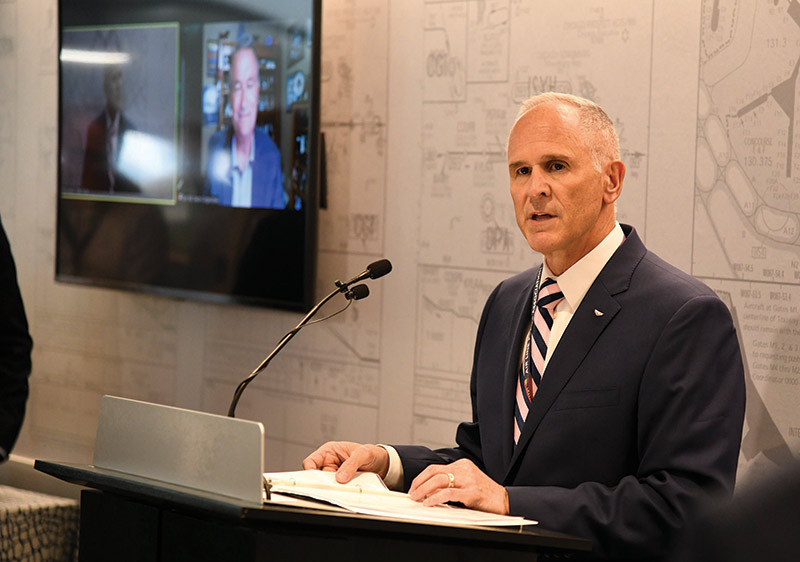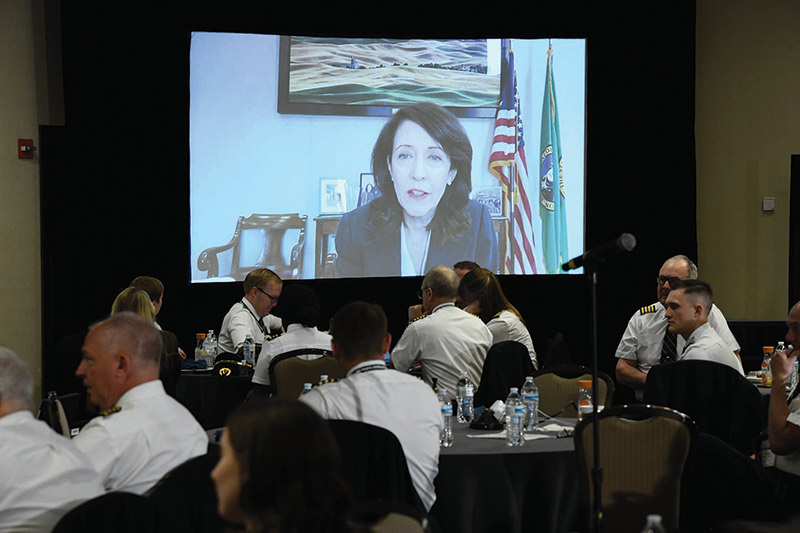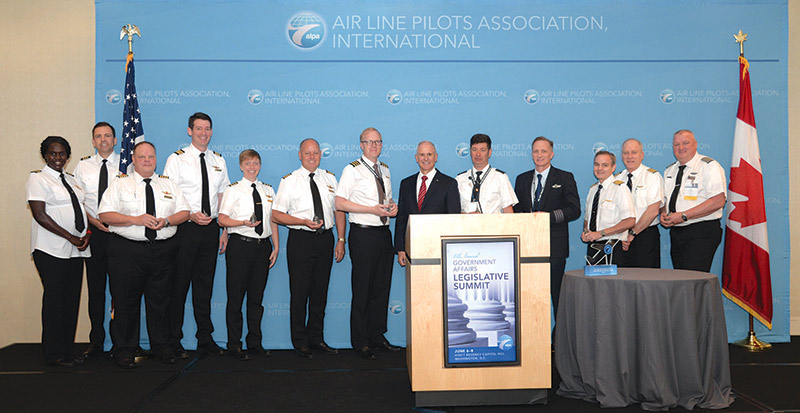Advancing Aviation Advocacy with a New Approach
By Kevin Cuddihy, Contributing Writer, and John Perkinson, Senior Staff Writer

Capt. Joe DePete, ALPA’s president, addresses participants of the Association’s 2021 Legislative Summit.
Year after year, legions of airline pilots assemble in Washington, D.C., in the spring as part of ALPA’s annual Legislative Summit to review the Association’s pilot-partisan agenda before traversing the corridors of Capitol Hill to share the union’s priorities with Members of Congress. However, the global spread of COVID-19 made in-person visits impossible in 2020, compelling ALPA’s Government Affairs Department to rethink its approach for the 2021 summit, held June 6–8, and how to circumvent any remaining pandemic restrictions.
Accordingly, 102 ALPA pilots from 33 states conducted 142 virtual meetings to reach out to their elected federal officials during the culmination of this year’s summit. On June 8, pilots met virtually with Members of Congress from their home states to promote the Fair and Open Skies Act (H.R. 3095). This important bill, if passed, would require the U.S. Department of Transportation (DOT) to make certain that new foreign air carrier permits issued to foreign airlines with operations to and from the United States adhere to fair competition and labor standards.
The bill draws special attention to airlines with atypical or flag-of-convenience business models. Atypical employment practices include treating airline pilots as self-employed or as independent contractors to make their work status more nebulous. Airlines with flag-of-convenience operations select other countries to base aspects of their operations to take full advantage of the most favorable tax environments, labor laws, and safety regulations. Both practices, if allowed to continue in the United States, could have a devastating impact on the U.S. aviation industry and airline jobs.
Fortunately, ALPA’s message was received loud and clear. The Association’s pilots, working in conjunction with ALPA’s corresponding Call to Action campaign, successfully convinced many of their congressional representatives to support the bill, substantially expanding the number of legislation co-sponsors from the original nine to 77 at last count. Summit participants also helped set the stage for the introduction of the Senate version of the bill.
Preparing for Deployment
“Because of each of you, our union is cultivating relationships and sharing our pilots’ perspective on Capitol Hill as never before,” said Capt. Joe DePete, ALPA’s president, to the pilots who convened in the nation’s capital as well as those who participated online. “We need only look to the creation, implementation, and extension of the historic payroll support program [PSP] to see how, together, we’re making our proworker, prosafety policy agenda a reality.”
DePete talked about the Fair and Open Skies Act, noting, “Right now, atypical and flag-of-convenience business models are among the most egregious examples of antiworker schemes in aviation. By cementing workers’ rights in the structure of air services agreements, the government can continue to cultivate a highly trained and experienced pilot workforce while enhancing safety and creating a strong profession to attract future aviators.”
This year’s modified event included a Sunday evening ALPA-PAC reception on June 6 with Rep. Don Bacon (R-NE). The actual summit began the following day, featuring discussions and educational segments showcasing Capitol Hill movers and shakers as well as ALPA pilots and staff.
Among the presentations, this year’s Legislative Summit featured a panel discussion titled “Effectively Communicating with Congress” consisting of three congressional staff members. Thomas “TJ” Story, the legislative assistant to Sen. Richard Blumenthal (D-CT), suggested that pilots “get to the ask as soon as possible,” reminding participants that the purpose of a meeting can easily get lost in the details. “Play up the home state connection,” said John Connell, chief of staff for Sen. Todd Young (R-IN), noting that the senator’s job is to represent his constituents.
Nancy Peele, chief of staff for Rep. Sam Graves (R-MO), told attendees, “Your real-life experience is wonderful,” adding that sharing a personal story tied to your message can make it more memorable. All three congressional staffers confirmed that their elected officials rely on advice and feedback from constituent pilots when determining support for aviation policy.
In another segment, Rep. Garret Graves (R-LA), the ranking member of the House Transportation and Infrastructure Committee, took time from his busy schedule to talk with the group about committee priorities like pandemic relief and the PSP, the impact of commercial space operations on national airspace, and the potential threat of cyberattacks. He also examined the role airline pilots can play in the legislative process, observing, “Bring your expertise. Bring your lessons learned, successes, and failures. Bring your ideas…. This is how our government is supposed to work.”
Dr. Todd Dewett, best-selling leadership author and coach, talked about the importance of being yourself when relating to others. “People like real,” he commented, adding that it’s important to look for examples of “falling on your face and framing them as a learning opportunity.” Dewett suggested that when engaging others, accepting imperfections rather than covering them up makes an individual a more interesting, more authentic person.
In addition to these and other presentations, pilots received video conference platform training, participated in breakout sessions on external communications and labor issues (see the PRO Act sidebar), and watched a series of prerecorded videos during their “down” time prepared specifically for the summit before conducting meetings with their federal officials.
Walking the Walk, Virtually
Summit participants approached the 142 appointments with their Members of Congress in nearly 142 different ways, drawing from different angles and personal experiences to make their collective case. Capt. Jason Schwerin (Endeavor Air) provided some context for the Fair and Open Skies bill in his meeting with Robert Curris, policy advisor to Sen. Debbie Stabenow (D-MI). Schwerin acknowledged the aviation industry’s surprise in 2016 when the DOT awarded a foreign air carrier permit to Norwegian Air International (NAI), despite its flag-of-convenience status.
“For the first time in its history, the DOT didn’t do the public-interest test,” remarked Schwerin. “It was the first time that it was ever just waived or not done, and that was a huge red flag for us.… As part of Open Skies agreements, we must make sure there’s a level playing field.” He observed that the new legislation mandates a multifactor public-interest test for foreign air carrier permit applications to restore integrity to the nation’s international aviation trade agreements.
F/O Kip Ellsworth (Frontier) explained to Rep. Diana DeGette (D-CO) that airlines applying atypical and flag-of-convenience operations often incorrectly assert that cutting corners and tilting the playing field in their favor is the only way they can provide inexpensive fares for the traveling public.
Ellsworth highlighted the success of his company, Frontier, as an ultra-low-cost carrier and proof that it can be achieved without harming safety and U.S. airline jobs. “The low-cost coverage that these flag-of-convenience airlines are trying to provide can be done within the rules while still remaining profitable,” he insisted. “Airlines like mine have shown that you can do it right and still succeed in a fair competition.”
Capt. Mark Manausa (Frontier), who spoke with Joe Russell, legislative assistant for Sen. Mark Kelly (D-AZ), pointed out the safety concerns with these business practices. “When a pilot at our airline submits a fatigue report,” he explained, “it goes not just to the company but also to the FAA and the union, and all three work together for the best outcome and to investigate the reasons. If you’re in an atypical business model, none of that happens. Things get swept under the rug because you don’t want to risk any negative repercussions.”
Capt. Doug Mattson (United) iterated that same point to Rep. Derek Kilmer (D-WA). Mattson mentioned that another ALPA pilot participating in the Legislative Summit, F/O Aluel Bol (Delta), previously flew for flydubai, a United Arab Emirates carrier. “Flydubai operates under that atypical employment model,” he said, noting, “She was describing for us what it was like there, where they’re hired under temporary contracts that might or might not be renewed.”
Mattson continued, “When I make a decision as a captain, I don’t ever think, ‘Is my job in jeopardy, is my contract going to be renewed.’ Aluel talked about a time when they had a captain who was being renewed in two months and that weighed heavily on him when he had to make a decision as far as a fatigue situation.”
Finding common ground and common relationships can be an effective icebreaker. Capt. Tony Sandrolini (JetBlue) related a story to Sen. Steve Daines (R-MT) regarding past conversations he had with then Rep. Greg Gianforte—now the Montana governor and a friend of Daines—about their shared interested in sailing. Sandrolini expressed to Daines that in his many years on the water, he’d never seen a ship flagged to the United States. He pointed out that the flag-of-convenience approach virtually annihilated the U.S. maritime industry during the 1900s and that its presence in the aviation industry, if allowed to continue, could be equally as harmful to U.S. airlines.
Streamlining operations in this manner can also impact customer service. F/O Taylor Campbell (JetBlue), speaking with Eric Kashdan, senior legislative aide to Sen. Edward Markey (D-MA), recalled an event with NAI at New York Stewart International Airport. “I remember the Norwegian flight canceled. You had a whole airport that was supposed to get on a B-787,” he recalled. “The gate agent left,” adding that no one at the facility remained to deal with the stranded passengers. “I couldn’t believe that an airline would operate in the United States in this manner,” said Campbell.
ALPA pilots fully support international aviation trade deals that allow airlines in both countries to offer cross-border passenger and air cargo services, provided that fair competition, adequate safety and security, and reasonable labor standards are upheld. “We welcome Open Skies agreements and also free trade,” said F/O Kaori Paris (United) to Rep. Abigail Spanberger (D-VA). “We’re not opposed to any of that.”
Many of the pilots thanked their federal officials for supporting pandemic assistance programs like the PSP. F/O Maggie Eickhoff (Delta) explained to Anna Cullen, a legislative assistant to Sen. Jon Ossoff (D-GA), how she spoke with potential furloughees routinely in her position as her pilot group’s Membership Committee chair. She acknowledged, “I witnessed a tremendous amount of stress and fear, and the PSP helped alleviate some of their concerns.”
“Where we are today is an example of how good an investment the PSP truly was,” said Capt. Joe Morowitz (United) to Rep. Frank Mrvan (D-IN). “If I get furloughed, they have to retrain me before I can get back into the system. Keeping me current and on staff has allowed us to recover quicker.”
F/O Andrew Olarte (United) shared a personal side of the PSP during his call with the office of Rep. Matt Cartwright (D-PA). “Last summer, I thought I was going to be out of a job,” he bluntly told Cartwright’s chief of staff, Hunter Ridgway. “And I know after 9/11, that event put back a pilot’s career by as much as a decade.”
Many of the participating Members of Congress affirmed the pilots’ remarks, pledging their support for the Fair and Open Skies Act. Rep. Mike Thompson (D-CA), a recent co-sponsor of the bill, readily acknowledged the inherent danger in allowing flag-of-convenience operations within the United States. “I don’t want people flying on planes that aren’t safe, and I damn sure don’t want to ride on a plane that’s not safe,” he said.
Protecting Our Right to Organize Act
The Legislative Summit also featured a breakout panel on the Protecting Our Right to Organize (PRO) Act. This important prolabor legislation (H.R. 842 and S. 420) would strengthen workers’ right to form a union, negotiate for changes, and ensure workers can bargain for changes without fear of retaliation. While the PRO Act primarily impacts workers organized under the National Labor Relations Act, ALPA wholly supports this proworker bill.
The U.S. House of Representatives passed the PRO Act with a bipartisan vote of 225 to 206. In the Senate, 47 senators are co-sponsors. Prospects for passage in the Senate are unclear as the legislation is unlikely to garner the 60 votes necessary to proceed under Senate rules.
Labor organizations nationwide have relentlessly advocated at the federal and state level to pass the PRO Act. Support of unions and the right to organize has been steadily increasing over the past two decades as workers have endured the 2008 recession, the COVID-19 pandemic, and continued downward pressure on wages resulting from unfair competition and lack of enforcement of U.S. international agreements.
Cantwell Receives ALPA’s 2021 Pilot Partisan of the Year Award, A-Team Members Recognized
Capt Joe DePete, ALPA’s president, presented the Association’s 2021 Pilot Partisan of the Year Award to Sen. Maria Cantwell (D-WA), who chairs the Senate Committee on Commerce, Science, and Transportation. Of Cantwell, DePete said, “Thanks to her leadership on the Senate Commerce Committee, the payroll support program is now hailed as one of the most job-saving legislative initiatives in this country’s history.”

Sen. Maria Cantwell (D-WA) receives the Association’s 2021 Pilot Partisan of the Year Award.
Cantwell remarked, “Thank you for this recognition, and I’ll certainly share it with my colleagues here in the Cantwell and Commerce offices for their hard work on this important legislation.” The senator acknowledged the nearly 2,500 airline pilots from her home state of Washington “who are participants in your organization. I meet and see them frequently since I’m a frequent flyer myself,” she said.
In addition, DePete recognized the 2021 class of A-Team members, pilot volunteers who completed ALPA’s Government Affairs Department’s long list of advocacy requirements. Receiving the accolade were Capt. Jason Ambrosi (Delta), F/O David Birch (United), F/O Aluel Bol (Delta), F/O Brandon Cantwell (Delta), Capt. Brett Colby (United), Capt. Mark DeJarnette (Delta), F/O Reed Donoghue (Delta), F/O Margaret Eickhoff (Delta), F/O Jessie Elliott (Delta), Capt. Eric Hall (Delta), F/O Jason Harbison (United), Capt. Andrew Hobin (Alaska), Capt. J.J. Hughes (JetBlue), Capt. Doug Mattson (United), Capt. Eric Metcalf (Envoy Air), and Capt. Joe Morowitz (United).

Capt. Joe DePete, ALPA’s president, recognizes the Association’s 2021 class of A-Team members, pilot volunteers who completed ALPA’s Government Affairs Department’s extensive list of advocacy requirements.

